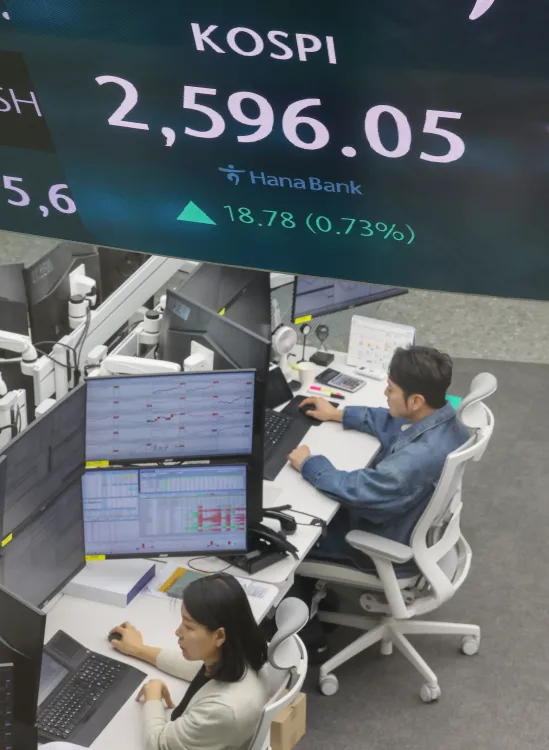Why Are Seoul Shares Rising for the Third Day?

Synopsis
Key Takeaways
- Seoul's stock market has gained for three consecutive days.
- Investor confidence is boosted by the Washington-Beijing trade deal.
- Semiconductor and biotech sectors are performing exceptionally well.
- Individual investors are currently net sellers, contrasting with institutional and foreign buying.
- The local currency has weakened against the US dollar.
Seoul, May 14 (NationPress) South Korean stocks continued their upward trajectory for a third consecutive day on Wednesday, spurred by the recent trade agreement between Washington and Beijing, which has enhanced investor enthusiasm for higher-risk assets. In contrast, the local currency depreciated against the US dollar.
The benchmark Korea Composite Stock Price Index (KOSPI) increased by 32.15 points, or 1.23 percent, concluding the day at 2,640.57. This follows a rise of 1.17 percent on Monday and a slight gain of 0.04 percent on Tuesday.
Trading activity was moderate, with a volume of 386.7 million shares valued at 8.76 trillion won (approximately $6.17 billion), as the number of winners surpassed that of losers at 588 to 291, according to reports from Yonhap news agency.
The surge was primarily driven by foreign and institutional investments. Offshore investors acquired a net total of 470.5 billion won, while institutions purchased a net 534.5 billion won, balancing out a net sell-off of 1 trillion won by individual investors.
Notable sectors that performed well included semiconductors, biotechnology, and entertainment. Chip manufacturer SK hynix, a major supplier for Nvidia, saw a significant increase of 3.78 percent, reaching 206,000 won, following the U.S. AI chipmaker's agreement to supply its Blackwell chip to Saudi Arabia.
Samsung Electronics rose by 0.88 percent to 57,400 won, while Hanmi Semiconductor, a supplier of chipmaking equipment, climbed 3.46 percent to 83,800 won.
The leading biotechnology company Samsung Biologics grew by 0.5 percent to 1 million won, and SK bioscience also increased by 0.5 percent to 40,200 won.
K-pop sensation Hybe surged by 3 percent to 275,000 won, and CJ ENM, the largest production studio in the country, saw a gain of 2.85 percent, closing at 57,800 won.
Defense sector stocks also experienced gains, rebounding from recent declines amid potential ceasefires in Europe and the Middle East. Hanwha Aerospace, a leader in the industry, increased by 1.99 percent to 820,000 won, while Korea Aerospace Industries (KAI) jumped 5.23 percent to 90,600 won.
By 3:30 p.m., the local currency was reported at 1,420.2 won against the U.S. dollar, a decrease of 4.2 won from the previous session.
Bond prices, which typically move inversely to yields, ended the day higher. The yield on three-year Treasuries fell by 1.9 basis points to 2.351 percent, while the return on the benchmark five-year government bonds dropped by 1.4 basis points to 2.482 percent.










